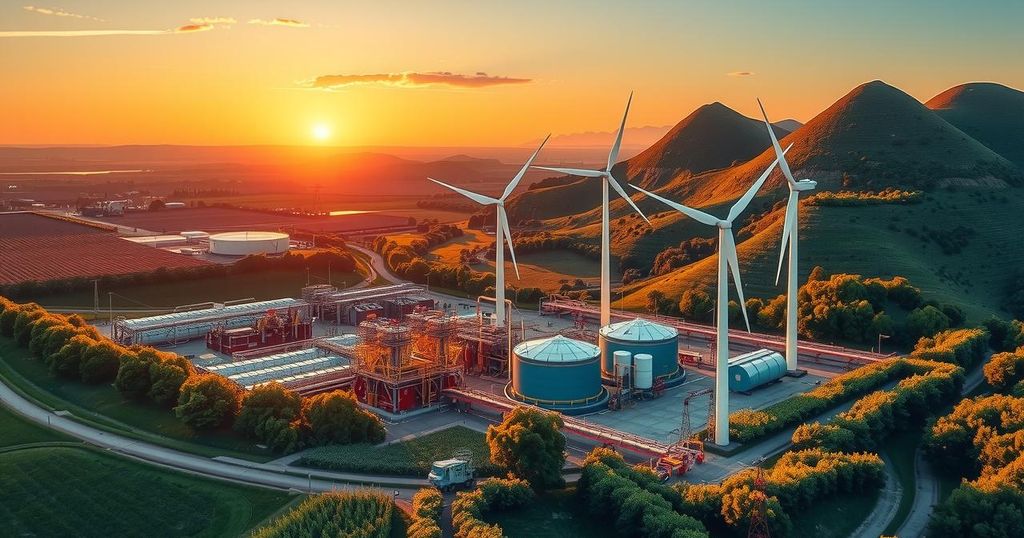Pierre Poilievre’s Advocacy for Canadian LNG Amid Environmental Concerns and Market Challenges

Pierre Poilievre, leader of Canada’s Conservative Party, promotes liquefied natural gas despite economic and environmental risks. Discussions suggest Germany and Japan are interested in Canadian LNG, though expert analysis indicates declining demand. The Canadian government has acknowledged the need for clean energy over fossil fuels, while recent reports show fossil fuel expectations facing significant challenges amid a global transition to renewables. The overarching narrative implies Poilievre’s goals may not align with emerging market realities or environmental urgency.
Pierre Poilievre, the Conservative Party leader and a possible contender for Canada’s prime minister, advocates for substantial investment in liquefied natural gas (LNG), despite risks associated with market saturation and environmental concerns. On a podcast with climate-change skeptic Jordan Peterson, he questioned why Canada imports oil when it possesses a vast natural gas supply, arguing for improved export capabilities.
Poilievre and Peterson claim that Canadian natural gas could serve requests from countries like Germany and Japan, highlighting perceived deficits caused by government regulations and bureaucracy. They assert that these nations have sought Canadian LNG to address their energy needs, claiming that offers have been made for long-term contracts due to urgent demand.
However, expert analysis underscores significant economic and logistical challenges for Canadian LNG exports. Reports indicate a decline in Japan’s LNG imports over the last decade, and forecasts predict a continued decrease in demand as nuclear and renewable energy become more favorable.
Moreover, the Canadian government has, contrary to Poilievre’s assertions, backed some LNG projects while refraining from large-scale subsidies for fossil fuels. The government, led by Prime Minister Justin Trudeau, has directed investments toward LNG developments in British Columbia, yet has also indicated the need for clean energy solutions to comply with greenhouse gas emission reduction targets.
Expert reports indicate a broader downward trend in LNG demand within Europe, emphasizing a transition towards renewable energy sources. Analysts suggest that Canadian LNG struggles to compete as European countries implement significant reforms aimed at decreasing fossil fuel reliance due to the European Green Deal initiated in 2019.
Additionally, claims that Germany’s leadership has persistently requested LNG from Canada lack substantiation. In meetings between Canadian and German officials after the Russian invasion of Ukraine, leaders acknowledged infrastructure limitations and the unviable business case for Canadian LNG exports to Europe. Germany’s envoy recently confirmed that demand for Canadian gas has diminished.
The notion that Canadian LNG could effectively displace coal usage in countries like India has also been scrutinized. Although some reports suggest potential environmental benefits, the broader implications of fossil fuel dependence are often dismissed, ignoring the carbon emissions tied to LNG production. Concern over misleading advertisements claiming global emission reductions prompted the Canadian Advertising Standards Council to take action against LNG promotional claims.
Poilievre’s ambition to transform Canada into an energy superpower through LNG exports overlooks substantial economic and environmental hurdles. His persistent anti-climate action stance juxtaposed against strong evidence for carbon taxation benefits demonstrates the challenges in promoting a fossil fuel-dependent future while meeting climate commitments.
As a whole, despite extensive support from some political figures for LNG expansion, substantial evidence indicates that such actions would not only be economically imprudent but also environmentally detrimental. Continued emphasis on fossil fuels in discourse fails to address urgent realities about the ongoing transition toward renewable energy solutions that align with global climate goals.
The topic centers on the debate surrounding the expansion of liquefied natural gas (LNG) in Canada, focusing on Pierre Poilievre’s advocacy despite the evident risks associated with such developments. It highlights the environmental and economic challenges, and the reactions from political figures, environmental analysts, and market conditions that underscore a shifting energy paradigm. The conversation is framed by recent historical contexts, including Canada’s engagements with international energy markets and climate policies, informing the complexities surrounding LNG exports and broader fossil fuel reliance.
In light of the extensive economic, infrastructural, and environmental challenges associated with LNG expansion, Poilievre’s vision of Canada as an imminent energy superpower appears primarily aspirational. Significant evidence points to the impracticality of such endeavors, especially as global and domestic shifts toward renewable energy intensify. The discussion reveals a critical need for informed and balanced energy policy that prioritizes sustainability and aligns with climate commitments.
Original Source: www.desmog.com






